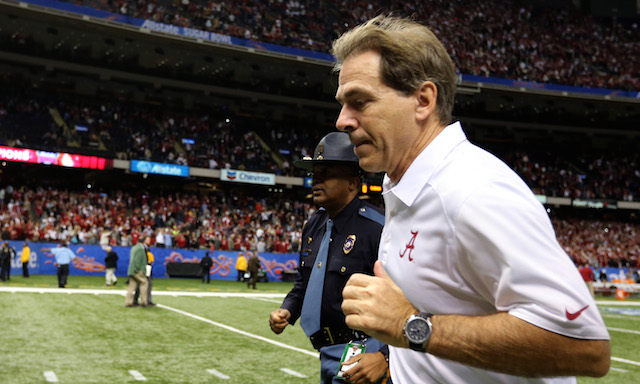
I truly hope that we never have to deal with as much debate about a rule that isn't going to be passed ever again, but Alabama's Nick Saban is still willing to talk about it, so we must as well. That's because Saban is largely considered the man to "blame" for the proposed "10-second rule" that would slow down up-tempo offenses for safety concerns.
Safety concerns that may or may not be real.
Saban talked to ESPN.com about the rule, and says he doesn't care about taking the blame for the rule proposal, he just believes this safety issue is something that should be looked into further.
"I don't care about getting blamed for this. That's part of it," Saban said. "But I do think that somebody needs to look at this very closely.
"The fastball guys (up-tempo coaches) say there's no data out there, and I guess you have to use some logic. What's the logic? If you smoke one cigarette, do you have the same chances of getting cancer if you smoke 20? I guess there's no study that specifically says that. But logically, we would say, 'Yeah, there probably is.'"
I can think of another connection between smoking and up-tempo offenses that Saban doesn't mention: all the cool kids are doing it. You want to be cool, don't you? Of course you do, everybody wants to be cool.
Seriously, I get what Saban is saying. I really do. It's simple logic to think that the more plays a player plays in the course of a game and a season, the better chance there is that he's going to be injured. It's just, the thing is, I don't have any data to support it -- but that's not stopping anybody these days so why bother finding it? -- but an argument could be made that a player is more likely to be injured in the "smashmouth" style of football that Saban prefers than he is in a spread offense. No matter how many plays are being run, nor how quickly.
That's the thing about football. Players are going to get hurt. The truth is that instead of worrying about prevention -- a fight nobody is going to win -- we should all be spending more time worrying about treatment.





















